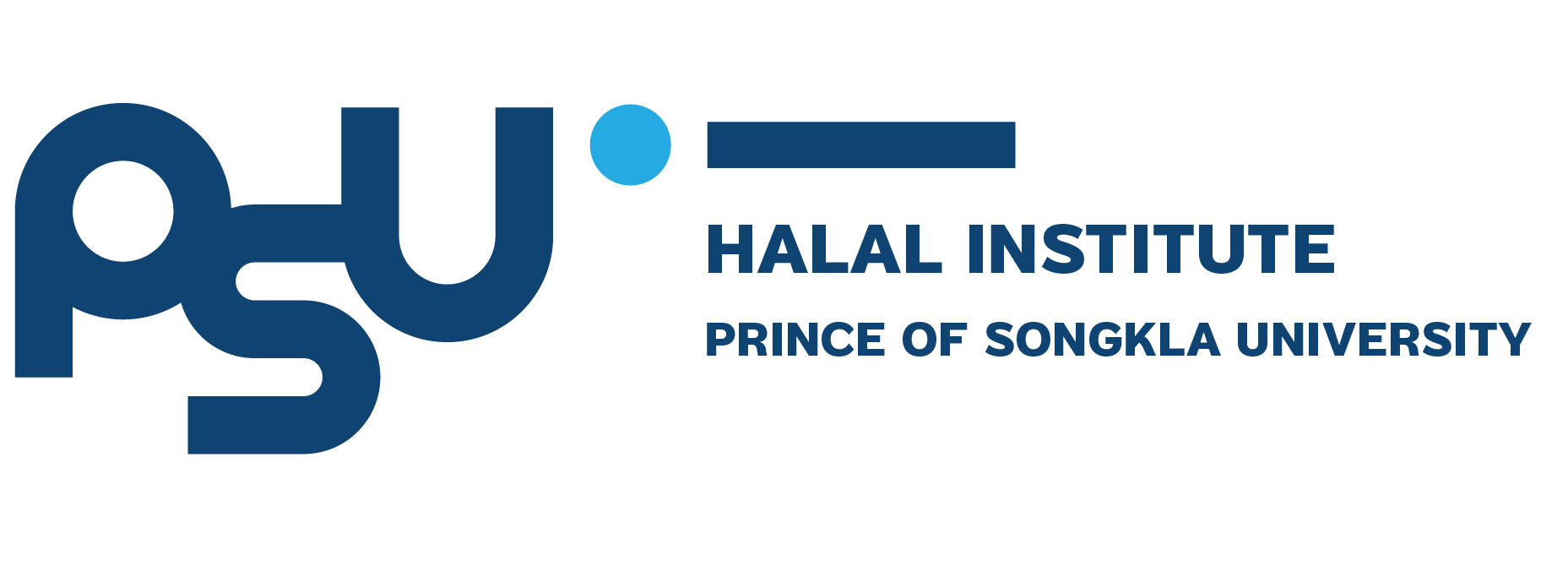หัวข้อวิจัย กลยุทธ์การพัฒนาการตลาดผลิตภัณฑ์อาหารฮาลาลของวิสาหกิจชุมชนในจังหวัดนราธิวาส
คณะนักวิจัย รศ.ดร.สุธัญญา ทองรักษ์
ผศ.ดร.สิริรัตน์ เกียรติปฐมชัย
นางสาวนูรีฮาน สาและ
หน่วยงานที่รับผิดชอบ คณะเศรษฐศาสตร์
ปีที่ได้รับงบประมาณ 2554
กลยุทธ์การพัฒนาการตลาดผลิตภัณฑ์อาหารฮาลาลของวิสาหกิจชุมชนในจังหวัดนราธิวาส
คณะผู้วิจัย รศ.ดร.สุธัญญา ทองรักษ์ 1
ผศ.ดร.สิริรัตน์ เกียรติปฐมชัย1
นางสาวนูรีฮาน สาและ1
บทคัดย่อ
การวิจัยนี้มีวัตถุประสงค์เพื่อศึกษาการดำเนินงานด้านการตลาด ศักยภาพและข้อจำกัดด้านการตลาดผลิตภัณฑ์อาหารฮาลาลของวิสาหกิจชุมชนในจังหวัดนราธิวาส เพื่อกำหนดกลยุทธ์การตลาดผลิตภัณฑ์อาหารฮาลาล ในการศึกษานี้ เก็บข้อมูลจากประธานวิสาหกิจที่ผลิตอาหารฮาลาล 44 รายใน 7 อำเภอ และเจ้าหน้าที่จากสำนักงานเกษตรอำเภอที่รับผิดชอบงานวิสาหกิจในพื้นที่ศึกษาทั้งหมด ในปี พ.ศ. 2555 วิเคราะห์ข้อมูลเชิงพรรณนา วิเคราะห์สภาพแวดล้อมภายในและภายนอก (SWOT) และกำหนดกลยุทธ์ทางการตลาดโดยใช้ทาวส์เมตริกซ์ (TOWS Matrix)
ผลการศึกษาพบว่า วิสาหกิจมีสมาชิกเฉลี่ย 21 คน สมาชิกส่วนใหญ่มีอาชีพหลักทำสวนยางพาราและทำนา เป็นชาวไทยมุสลิมและพูดภาษามลายูได้ สมาชิกมีส่วนร่วมในการดำเนินกิจกรรมของวิสาหกิจในระดับปานกลาง และทำงานที่วิสาหกิจเฉลี่ยไม่เกิน 3.5 วัน/สัปดาห์ วิสาหกิจมีเงินทุนหมุนเวียนเฉลี่ย 21,840 บาท/เดือน วิสาหกิจส่วนใหญ่ได้รับการสนับสนุนเครื่องจักรและอุปกรณ์หลักในการผลิตและบรรจุภัณฑ์จากภาครัฐ วิสาหกิจครึ่งหนึ่งผลิตขนมอบ ซึ่งมีการแข่งขันสูงและสินค้าสามารถทดแทนได้ง่าย เพราะพึ่งพาตลาดในพื้นที่เป็นหลัก ผลิตภัณฑ์ของวิสาหกิจส่วนใหญ่ไม่ได้รับการรับรองคุณภาพ วิสาหกิจไม่มีกลยุทธ์ด้านราคา เพียงแต่กำหนดราคาขายจากต้นทุนบวกกำไรที่ต้องการและไม่มีการติดป้ายราคาสินค้า โดยภาพรวมสรุปได้ว่า วิสาหกิจมีกิจกรรมส่งเสริมการตลาดน้อยมาก
วิสาหกิจมีจุดแข็งเพียง 2 ประการ คือ การตั้งอยู่ในพื้นที่ชายแดนที่ค้าขายกับมาเลเซียได้สะดวก และสมาชิกพูดภาษามลายูได้ แต่มีจุดอ่อนหลายประการ ได้แก่ ขาดความพร้อมในการทำงานกลุ่ม พึ่งพารัฐมากเกินไป ไม่มีผู้รับผิดชอบงานด้านการตลาด ผลิตภัณฑ์อาหารฮาลาลเกือบทั้งหมดไม่ใช่อาหารมุสลิมหลัก และไม่มีความหลากหลาย ไม่ได้รับการรับรองคุณภาพ ทำให้ช่องทางการตลาดแคบ และไม่ได้ใช้วัตถุดิบหลักในพื้นที่ ในด้านโอกาสนั้นวิสาหกิจมีโอกาสพอสมควร เนื่องจากประชากรมุสลิมเพิ่มขึ้นมาก อาหารฮาลาลเป็นที่ยอมรับของผู้บริโภคทุกศาสนา รัฐให้การส่งเสริมวิสาหกิจในพื้นที่มากเป็นกรณีพิเศษ แต่ อุปสรรคก็มีค่อนข้างมาก การแข่งขันกันในผลิตภัณฑ์ขนมอบในพื้นที่ รัฐให้ความช่วยเหลือไม่ตรงจุด เจ้าหน้าที่ของรัฐที่รับผิดชอบโดยตรงขาดความรู้ในเชิงธุรกิจและการตลาด และการสนับสนุนของภาครัฐยังขาดการบูรณาการ
งานวิจัยนี้ได้เสนอกลยุทธ์การตลาดสำหรับวิสาหกิจดังนี้คือ เน้นตั้งแต่การเลือกผลิตผลิตภัณฑ์ที่เหมาะสมเป็นอันดับแรก และพัฒนาจากฐานดังกล่าว ได้แก่ 1) สร้างอัตลักษณ์ผลิตภัณฑ์จากความเป็นมุสลิมและฮาลาล และเน้นการใช้วัตถุดิบที่มีในท้องถิ่น 2) จากนั้นขยายตลาดไปยังมาเลเซีย ซึ่งเป็นประเทศมุสลิมที่มีอำนาจซื้อสูง 3) สำหรับวิสาหกิจที่ผลิตผลิตภัณฑ์จากวัตถุดิบหลักในพื้นที่และเป็นที่ต้องการของตลาดอยู่แล้ว ควรพัฒนาผลิตภัณฑ์เพิ่มเติม เช่น บรรจุภัณฑ์ คุณภาพ เพื่อเพิ่มช่องทางการตลาดให้ครอบคลุมกลุ่มลูกค้ามากขึ้น 4) วิสาหกิจควรเลือกรับการสนับสนุนเฉพาะในสิ่งที่ต้องการจากหน่วยงานรัฐ 5) วิสาหกิจควรแก้ไขจุดอ่อนเกี่ยวกับการบริหารจัดการด้านการตลาดโดยมีผู้รับผิดชอบด้านการตลาดที่พร้อมพัฒนาศักยภาพด้านการตลาด เพื่อให้วิสาหกิจสามารถทำการตลาดในเชิงรุกได้ เช่น ให้สมาชิกที่เป็นคนรุ่นใหม่เข้ามาช่วยด้านการตลาด หน่วยงานรัฐที่เชี่ยวชาญด้านการตลาดเข้ามาช่วยเป็นพี่เลี้ยง 6) วิสาหกิจต้องบริหารจัดการในเชิงธุรกิจมากขึ้น โดยเฉพาะการคำนวณต้นทุนที่สะท้อนต้นทุนการผลิตที่แท้จริง เพื่อนำไปสู่การตั้งราคาผลิตภัณฑ์ที่เหมาะสม ซึ่งจะทำให้วิสาหกิจชุมชนสามารถอยู่ได้โดยไม่พึ่งรัฐมากเกินไป
Marketing Strategies for Halal Food Products of the Community Enterprises in Narathiwat Province
ABSTRACT
This research aims to examine; marketing operation, marketing potential and limitations of Halal food products of community enterprises (CEs) in Narathiwat province; and to formulate marketing strategies for Halal food products. Data were collected from heads of 44 CEs in 7 districts and agriculture extension officials of the seven districts in 2012. Descriptive and SWOT analysis were applied. TOWS matrix was used to formulate marketing strategies.
The results revealed that the CEs have average members of 21 people. Most of them are rice and rubber farmers. Most members are Muslims who are able to speak Malay. Members moderately involve in CEs’ activities. They work at the CEs for no more than 3.5 days/week. The CEs’ average working capital is 21,840 baht/month. The majority of CEs obtained production and packaging machineries and equipment from government agencies. Half of the CEs produce bakeries which are non-competitiveness and easily substituted by similar products available in the local market. Moreover, most of the CEs’ products were not quality certified. The CEs do not have price strategy, but they determined the price by adding profit margin to the production cost, and do not have price tags. Overall the CEs perform very little marketing promotion activities.
CEs have limited strength namely they are located near Malaysian border and members can speak Malay. On the other hand, CEs have various weaknesses, for example, their lack of teamwork; they are dependent on governmental support; there are no responsible personnel for marketing task; almost of their products are not of any kind of food Muslims routinely consume and less diversity; their products have not been quality certified; narrow marketing channel; and the main ingredients are not produced locally. For opportunities, there are some opportunities for these products due to high growth rate of Muslim population, increasing demand from non-Muslims, intensive government support. However, there are a number of threats, for example, the competition of bakery products in the area; miss-targeted government supports; responsible officials lack of business and marketing expertise; and non-holistic supports of government agencies.
This research suggested that CEs’ marketing strategies should be first focused on the selection of suitable products, and then further strategies could be developed from that basis. The purposed strategies are; 1) product differentiation, 2) market diversification, 3) for those CEs that already source their main ingredients locally and their products are already popularized by consumers, they should adopt product development strategies ie. improve products packaging, product quality improvement, in order to expand market channels so that their products can be accessed by larger pool of consumers, 4) CEs should selectively accept only applicable and beneficial supports from government agencies, 5) CEs should appoint a responsible person for marketing work i.e. a new young member, and also to ask marketing experts from government agencies for guidance, and 6) CEs should manage their businesses professionally.
1คณะเศรษฐศาสตร์ มหาวิทยาลัยสงขลานครินทร์

